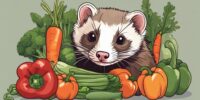What Common Household Foods Are Dangerous to Ferrets?
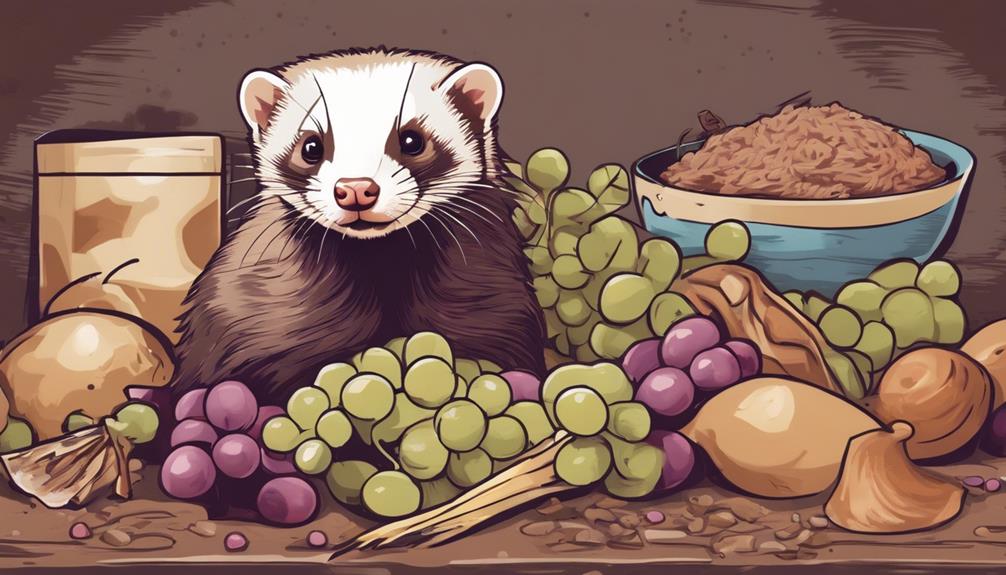
Dangerous Household Foods for Ferrets:
- Avocado
- Chocolate
- Onions
- Garlic
- Caffeine
- Grapes
- Dairy Products
Chocolate
Chocolate is a toxic food for ferrets due to its theobromine content, which can lead to serious health issues when ingested. The cocoa toxicity in chocolate affects ferrets similarly to other animals, causing symptoms like vomiting, diarrhea, rapid breathing, increased heart rate, and even seizures. Dark chocolate poses a higher risk due to its elevated theobromine levels compared to milk chocolate.
It's crucial for ferret safety to keep all forms of chocolate, including cocoa powder and baking chocolate, out of reach from these curious pets. Even small amounts of chocolate can be harmful to ferrets, and immediate veterinary attention is necessary if ingestion occurs. Baking dangers also arise when using chocolate around ferrets, as they may accidentally consume it or lick remnants from cooking surfaces.
To prevent cocoa toxicity in ferrets, it's essential for pet owners to be vigilant and ensure that chocolate is stored securely away from their furry companions.
Onions and Garlic
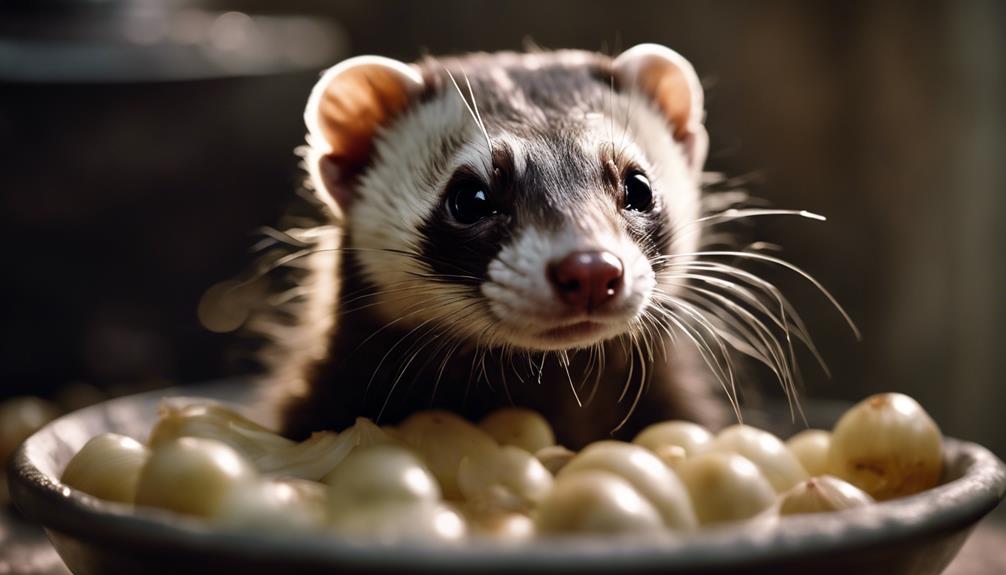
Onions and garlic are common household ingredients that pose a significant threat to ferrets due to their potential toxicity. These foods contain compounds that can cause oxidative damage to a ferret's red blood cells and lead to serious health issues.
Key Points:
- Toxicity Risks: Onions and garlic belong to the Allium plant family, which contains substances like thiosulfates that can be toxic to ferrets. Ingesting these foods can lead to conditions such as hemolytic anemia, where red blood cells are destroyed, causing weakness, lethargy, and even organ damage.
- Cooking Precautions: It's crucial to ensure that ferrets don't have access to any dishes containing onions or garlic, whether raw, cooked, or powdered. Even small amounts can be harmful. Care should also be taken with leftovers, sauces, or foods seasoned with onion or garlic as these can also pose a risk.
- Prevention: To safeguard your ferret's health, always read ingredient labels carefully and store onions and garlic securely out of reach of your furry friend. If you suspect your ferret has ingested these foods, contact a veterinarian immediately for guidance on the next steps to take.
Caffeine
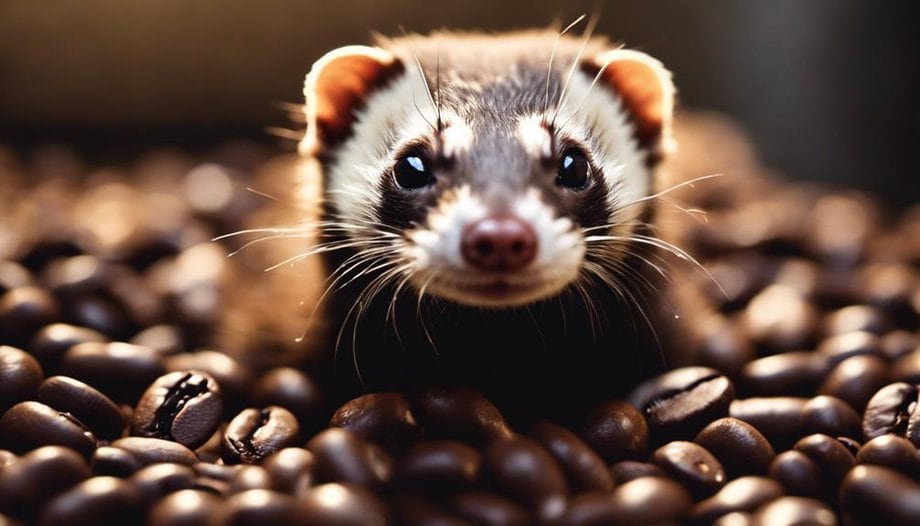
Ferrets are highly sensitive to the effects of caffeine, a stimulant commonly found in various beverages and products. When it comes to ferrets, caffeine can be particularly dangerous due to their small size and unique metabolism. Energy drinks, which often contain high levels of caffeine, should never be given to ferrets as they can lead to severe health issues or even be fatal. Even a small amount of caffeine can cause increased heart rate, restlessness, tremors, and in severe cases, seizures in ferrets. It is crucial to keep all caffeinated beverages and products away from these pets to ensure their well-being.
| Caffeine Source | Impact on Ferrets | Precaution |
|---|---|---|
| Energy Drinks | Severe health issues or fatality | Avoid entirely |
| Tea | Moderation is key | Avoid excessive consumption |
Moderation is key when it comes to caffeine consumption in ferrets. Tea, if given in moderation, is less likely to cause harm compared to energy drinks. However, it is essential to remember that even small amounts of caffeine can have adverse effects on these small animals.
Grapes and Raisins
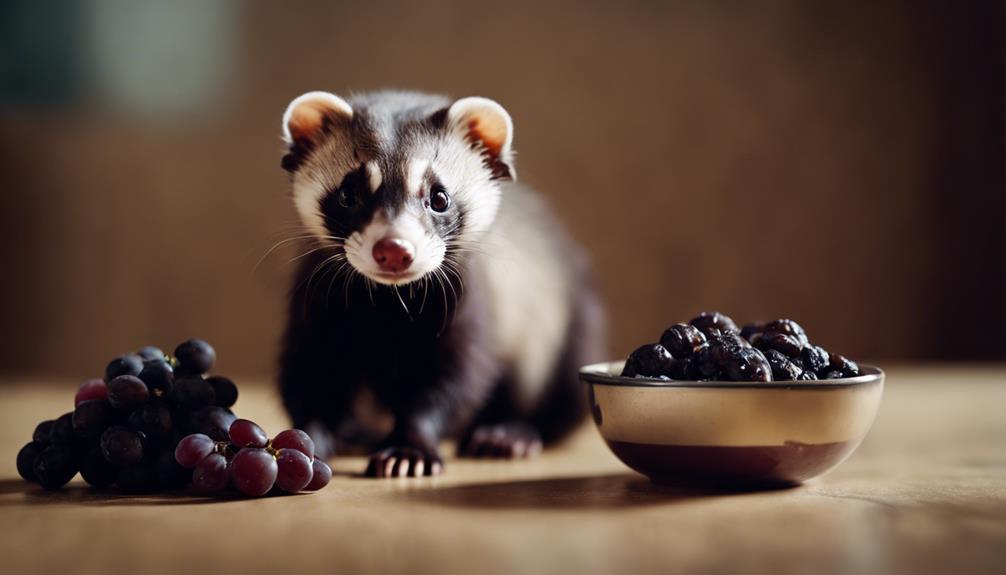
Grapes and raisins pose a significant health risk to small pets like ferrets due to their toxicity. Ferrets have a sensitive digestive system, making them susceptible to various foods that are harmless to other animals. When it comes to ferret diet restrictions, it's crucial to be aware of what they can and can't consume to ensure their well-being.
Key Points:
- Ferret safe treats: Grapes and raisins should never be offered as treats to ferrets due to their potential toxicity. Even in small amounts, these fruits can lead to severe health issues in ferrets.
- Keep within diet restrictions: Ferret owners must be vigilant about adhering to the diet restrictions in place for these small pets. Avoiding grapes and raisins is essential to prevent any adverse reactions in ferrets.
- Toxicity concerns: The substances within grapes and raisins can cause kidney failure in ferrets, making it imperative to keep these fruits away from their reach. Always opt for ferret-safe treats recommended by veterinarians to maintain their health and well-being.
Dairy Products
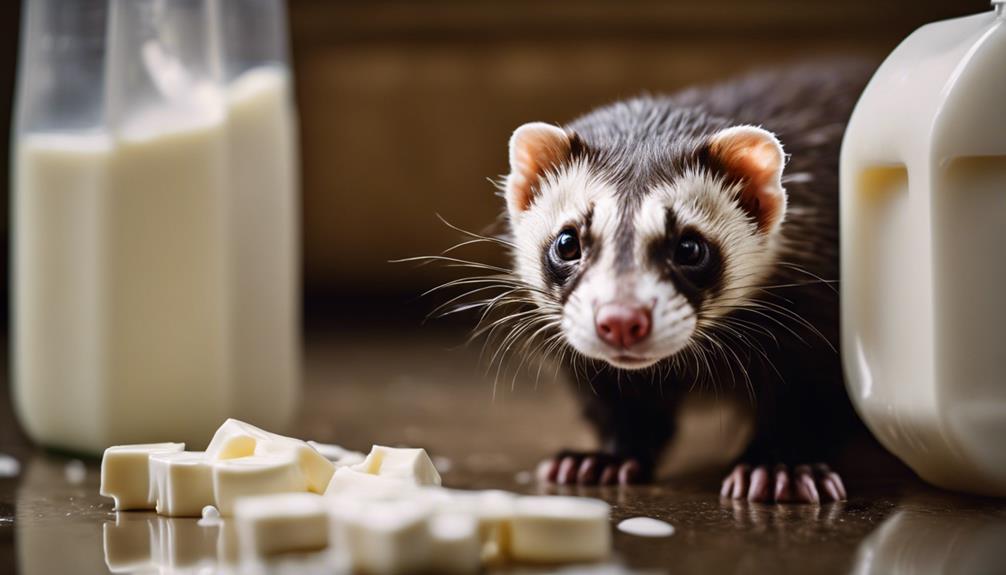
Dairy products can pose risks to ferrets due to their lactose intolerance. Ferrets lack the necessary enzyme to digest lactose properly, leading to gastrointestinal issues like diarrhea and bloating.
While small amounts of cheese or yogurt might be tolerated by some ferrets, it's generally best to avoid dairy products altogether.
Dairy and Ferrets
Consuming dairy products can lead to digestive issues in ferrets due to their inability to properly digest lactose. When considering dairy and ferrets, it's crucial to understand the potential risks involved. Here are essential points to consider:
- Lactose Intolerance: Ferrets lack the necessary enzymes to break down lactose, leading to gastrointestinal upset.
- Diarrhea and Dehydration: Dairy consumption can result in diarrhea, causing dehydration and electrolyte imbalances in ferrets.
- Dairy Alternatives: Ferrets can be offered lactose-free alternatives like ferret-specific milk replacers to avoid digestive disturbances.
For optimal health, it's advisable to steer clear of dairy products and opt for suitable alternatives to ensure your ferret's well-being.
Lactose Intolerance Risks
When considering the impact of lactose intolerance on ferrets, it becomes evident that dairy products pose significant risks to their digestive health. Ferrets lack the necessary enzyme, lactase, to break down lactose found in dairy, leading to gastrointestinal issues like diarrhea, bloating, and discomfort. To mitigate these risks, it is essential to opt for dairy alternatives that are lactose-free. Additionally, incorporating digestive enzymes or supplements can aid in the digestion of lactose-containing foods, promoting better gastrointestinal health in ferrets. Ensuring a diet that is free from dairy products is crucial in preventing digestive disturbances and maintaining the overall well-being of these small pets.
| Dairy Alternatives | Digestive Enzymes |
|---|---|
| Lactose-free milk | Enzyme supplements |
| Almond milk | Probiotics |
| Coconut milk | Papaya enzymes |
| Soy milk | Bromelain |
| Oat milk |
Cheese and Yogurt
The consumption of cheese and yogurt by ferrets can lead to digestive issues due to their lactose intolerance. Ferrets lack the necessary enzymes to break down lactose, the sugar found in dairy products, which can result in gastrointestinal discomfort. To ensure the well-being of your ferret, it's crucial to avoid feeding them cheese and yogurt.
Here are three essential points to consider:
- Dairy alternatives: Opt for lactose-free options or specialized ferret-safe treats to prevent any digestive disturbances.
- Ferret treats: Choose treats specifically designed for ferrets to provide them with a balanced diet and avoid unnecessary health risks.
- Moderation: If you decide to offer dairy products occasionally, ensure it's in small quantities to reduce the likelihood of adverse reactions.
Salty Snacks
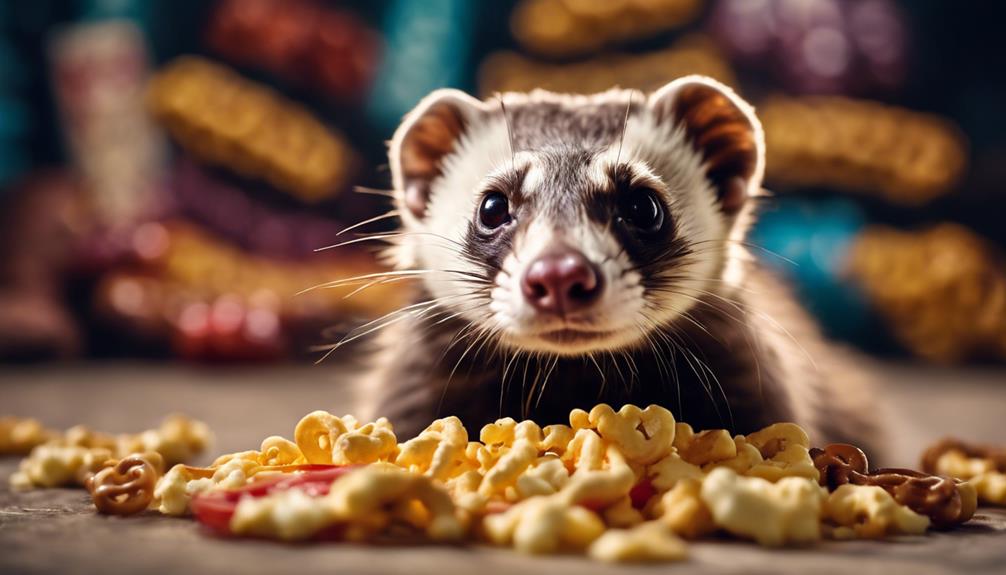
High levels of salt in snacks pose a significant health risk to ferrets. Ferrets are highly sensitive to high sodium content, which can lead to various health issues. Salty snacks like potato chips, pretzels, and salted nuts should be strictly avoided in a ferret's diet. Excessive salt intake can cause dehydration, kidney problems, and electrolyte imbalances in these small animals. Ferrets lack the ability to efficiently process and excrete excess salt from their bodies, making them particularly vulnerable to the adverse effects of high-sodium foods.
To ensure the well-being of ferrets, it's crucial to offer them a balanced diet that's low in salt. Instead of salty snacks, ferrets should be provided with species-appropriate food that meets their nutritional needs. Fresh water should always be available to prevent dehydration, especially when feeding commercial ferret food that may contain some level of sodium. By being mindful of the sodium content in their diet, ferret owners can help prevent potential health risks associated with salty snacks.
Raw Meat
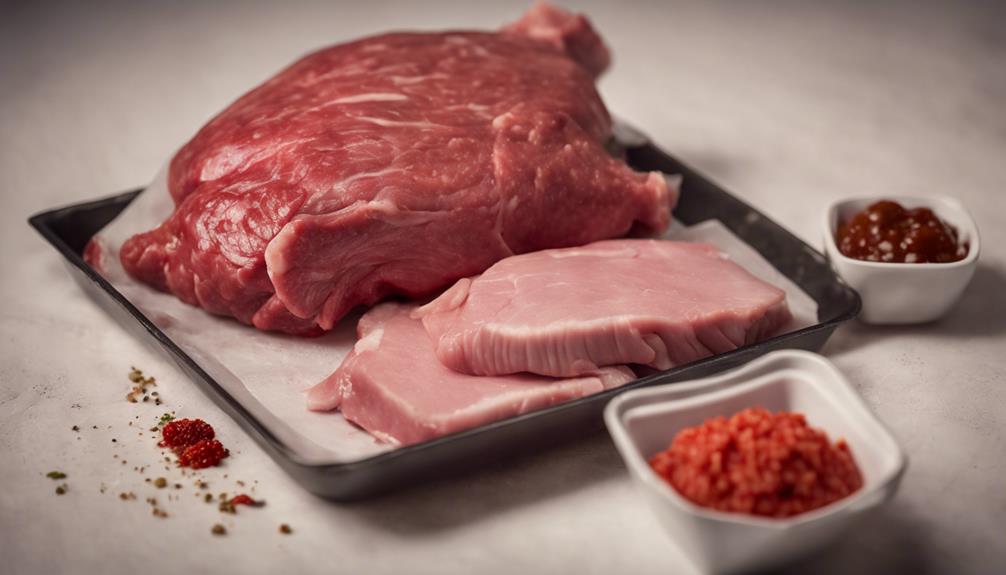
Excessive consumption of raw meat can pose serious health risks to ferrets due to their unique dietary requirements and digestive system. When considering feeding raw meat to ferrets, it's crucial to understand the potential dangers associated with it.
Key Points to Consider:
- Meat Safety: Raw meat can harbor harmful bacteria such as Salmonella and E. coli, which may lead to severe gastrointestinal issues in ferrets.
- Risk of Nutritional Imbalance: Feeding raw meat exclusively can result in nutrient deficiencies since ferrets require a balanced diet consisting of proteins, fats, and other essential nutrients.
- Parasitic Infections: Raw meat may contain parasites like Toxoplasma gondii or Trichinella spiralis, which can infect ferrets and cause significant health problems if consumed.
Considering these raw meat risks, it's advisable to consult with a veterinarian or ferret nutrition specialist before incorporating raw meat into a ferret's diet. Proper handling, storage, and cooking of meat can help mitigate these potential hazards and ensure the well-being of your ferret.
Frequently Asked Questions
Can Ferrets Eat Cooked Meat That Is Seasoned With Salt or Other Spices?
When cooked meat is seasoned with salt or other spices, it may not be suitable for ferrets. Overly seasoned or salted food can lead to health issues in these small animals. Opt for ferret treats or raw diets instead.
Are There Any Types of Chocolate That Are Safe for Ferrets to Consume in Small Quantities?
In small quantities, carob is a safe alternative to chocolate for ferrets. It can be used in baking for ferrets to create delicious treats. Always opt for ferret-safe sweets to avoid any potential harm.
What Should I Do if My Ferret Accidentally Ingests a Small Amount of Onion or Garlic?
In case of accidental onion or garlic ingestion by a ferret, prompt vet consultation is crucial. Watch for symptoms like vomiting or lethargy. Emergency care may be needed. Prevention is key; keep harmful foods out of reach.
Can Ferrets Have Small Amounts of Dairy Products Like Cheese or Yogurt?
Ferrets have limited dairy tolerance due to their unique digestive system. While some can handle small amounts of cheese or yogurt, many may experience gastrointestinal upset. It's best to monitor their reaction and consult a vet for guidance.
Are There Any Potential Health Risks for Ferrets if They Consume Small Quantities of Caffeine From Sources Like Tea or Coffee?
When ferrets consume small quantities of caffeine from sources like tea or coffee, potential health risks may arise. Caffeine consumption can lead to hyperactivity, heart palpitations, tremors, and even seizures in these small animals.




